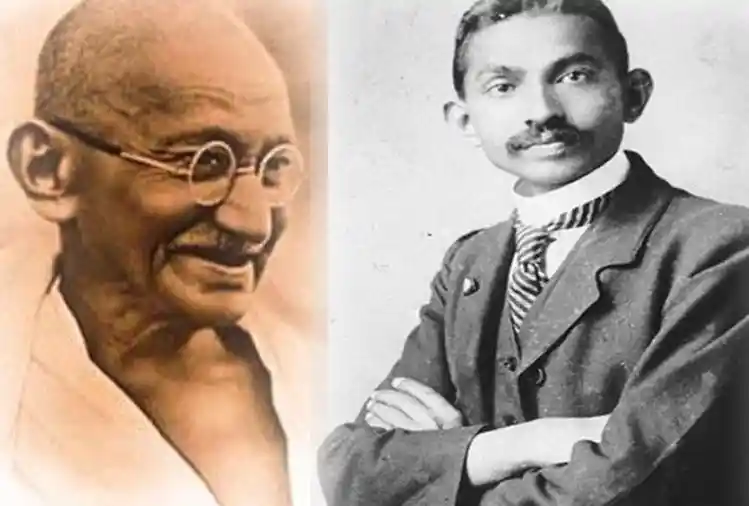Mahatma on Board
The story of the student who went on to become the greatest leader of all times.

Gandhi old and young; Image Source: Amar
“He was wearing a high silk top hat, burnished bright; a Gladestonian collar, stiff and starched; a rather flashy tie displaying almost all the colours of the rainbow, under which was a fine striped silk shirt. He wore a morning coat, a double-breasted vest [waistcoat], and dark striped trousers, and not only patent leather boots but spats over them. He carried leather gloves and a silver-mounted stick.”- Sachidanand Sinha
A man in a simple khadi loincloth with a shawl to cover his body, trademark round-framed, and metal-rimmed eyeglasses, and a stick in hand.
If we ask you to identify the men being referred to in these descriptions, the latter might ring a bell, the first one does not, right? What if we tell you that both refer to the same man. Shocking, isn’t it?
The man who we have always visualised as a proponent of all things Indian, whose name resonates with the fabric of the nation-Khadi, had once given into the fad of an English-style living. At the age of 19, when Mohandas Karamchand Gandhi sailed for England to study law, he adopted certain elements from the ‘English-high gentry-lifestyle’.
Embarrassed by his white flannels, he decided to buy well-tailored clothes, even took lessons in ballroom dancing, violin, French, and also elocution, to suit the London way of life. When in Rome (London), do as the Romans (Londoners) do!
For the first time in his life in 1888, Gandhi set out to give shape to his future and to become a barrister. He was leaving India for the first time. At that time, there was a taboo in India, especially for Hindus, for whoever would cross the foreign waters (black waters or kaala paani) would be committing an act against their religion and lose their caste and respectability in the society. Gandhi’s mother was also apprehensive of sending away her youngest son to England. She argued that Gandhi would give into myriad temptations once he leaves India. To console his mother, Gandhi took a vow that even in England, he would remain a vegetarian, will not consume alcohol, and would not touch any woman. At last, Putlibai concurred and Gandhi sailed for England aboard the steamer SS Clyde from Bombay to London on a 7-week journey.
While Gandhi has majorly been viewed and portrayed by the world as this perfect ideal man, who used the tools of ahimsa and satyagraha to achieve freedom for India from British rule; in his first trip to London, we come across several instances of Gandhi as a regular student who was making mistakes, learning, and correcting them, he was taking life as it were.
As anyone thousands of kilometers away from their homes would, Gandhi had troubles ‘ fitting in’, initially he became miserably homesick and wanted to leave everything and run back to Gujarat. But he stayed.
In his later life, Gandhi was this strong-willed and resolute human, who with his sheer determination was able to achieve the feats that he did, but contrarily, on his journey to England, Gandhi was even shy of asking whether the meals that had been prepared on the ship were vegetarian or not, and therefore spent most of his time in his cabin alone, feeding on fruits and the snacks that he had packed from Gujarat.
While he had taken a pledge of vegetarianism for his mother, it was in London that he stumbled upon a book, A Plea for Vegetarianism by Henry Salt, after reading which he declared vegetarianism as his choice. He became a leading member of the Vegetarian Society in Britain as vegetarianism had begun gaining popularity.
It was here that Gandhi became interested in the radical politics of London. He considered himself opportune to have met radical leader Annie Besant and leader of theosophical society Madam Blavatsky.
Gandhi's trip, though short but was remarkable in its own ways. He developed an admiration for the British people, which continued throughout his life. Living in a distant land, he understood the importance of discipline, asserted much confidence in himself, and went on to become the greatest leader of all times.
Gandhi cleared his final examination with flying colours at the Inner Temple and it was on June 10, 1891, three years after his arrival in England that his purpose had been fulfilled. He was called to the Bar and was admitted as a barrister and was formally enrolled in the High Court the next day. On the 12th of June, Gandhi sailed back to India as a lawyer.
The next time Gandhi would return to London in 1906 was as a prominent leader of the South Asian Community in South Africa.


